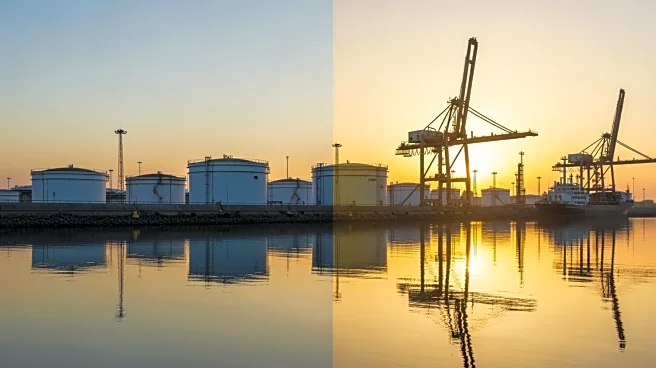What's Happening?
Russia's Novorossiysk port, a key Black Sea export hub, resumed oil loadings after a two-day suspension caused by a Ukrainian missile and drone attack. The attack damaged two oil berths, temporarily halting exports equivalent to 2.2 million barrels per
day, which accounts for 2% of global supply. The Caspian Pipeline Consortium, exporting oil from Kazakhstan, also resumed operations after a brief suspension. Novorossiysk is crucial for Russian crude exports, handling about a fifth of the country's output. A prolonged shutdown could have led to costly closures of oil wells in West Siberia, significantly affecting global oil markets.
Why It's Important?
The resumption of oil trade at Novorossiysk is significant due to its role in global oil supply. The temporary suspension led to a more than 2% increase in global oil prices, highlighting the port's importance in maintaining market stability. The attack underscores ongoing geopolitical tensions between Ukraine and Russia, with potential implications for energy security and economic stability worldwide. The ability of Russia to quickly resume operations mitigates immediate supply concerns but highlights vulnerabilities in critical infrastructure that could be exploited in future conflicts.
What's Next?
The geopolitical landscape remains tense, with potential for further disruptions in oil supply if attacks continue. Stakeholders, including global oil markets and political leaders, will likely monitor the situation closely. Russia may increase security measures at key infrastructure sites to prevent future attacks. The international community may also engage in diplomatic efforts to de-escalate tensions and ensure stable energy supplies. The situation could influence future policy decisions regarding energy security and international relations.
Beyond the Headlines
The attack on Novorossiysk highlights the strategic importance of energy infrastructure in geopolitical conflicts. It raises questions about the security of global supply chains and the potential for economic warfare. The incident may prompt discussions on diversifying energy sources and investing in alternative routes to mitigate risks associated with concentrated supply hubs. Additionally, it could lead to increased scrutiny of the environmental and ethical implications of energy dependency on conflict-prone regions.
















